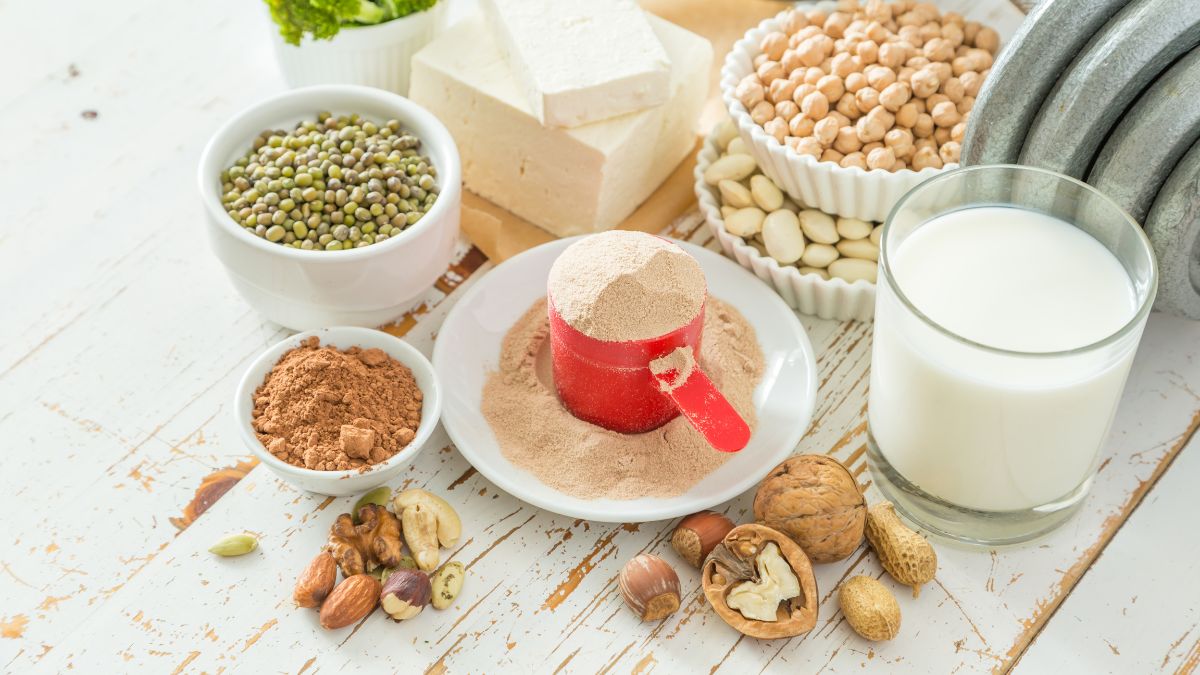Yes, fighters and MMA fighters, in particular, consume vegan protein powder. Nutrition plays a crucial role in enhancing an athlete’s performance, recovery, and overall well-being. As fighters continuously push their physical limits, they require optimal sources of protein to fuel their bodies and maintain peak performance. Furthermore, with the increasing popularity of plant-based diets and a growing awareness of their potential benefits, many are wondering whether vegan protein powders have found their way into fighters’ nutritional arsenals.
Fighters do consume protein powders as part of their plant-based diet. They make plant-based protein shakes, put it in the pancake or waffle mixture, or make more complicated recipes such as protein cookies. Some of the well-known fighters who consume vegan protein powders are Nate Diaz and Mac Danzig.
In this article, I will delve into the recent trends and research surrounding vegan protein sources, uncovering whether elite fighters are embracing plant-based options and examining the impact of these choices on their performance and recovery, and make a list of the best vegan protein powders you can try.
What Do the Studies Say?
According to Men’s Health, a recent study has demonstrated that substituting whey protein with rice protein provides the same results for elite mixed martial arts (MMA) fighters. The study, titled “The Body Composition Effects of Extra Protein in Elite Mixed Martial Artists Undergoing Frequent Training Over a Six-Week Period,” observed 11 fighters and found that plant-based protein supplements are equally effective as whey protein in building and maintaining muscle and aiding recovery. The key is to consume the protein shake at the right time.
ESPN also cites researcher Kalman, who explains that non-dairy and non-meat proteins have often been considered inferior to meat-based proteins. However, there is now mounting evidence that rice protein is just as effective for maintaining body weight and muscle mass in elite athletes, including MMA fighters.
Some athletes prefer non-dairy options, either for dietary reasons or due to taste and digestive issues. UFC bantamweight fighter Andre Soukhamthath, as quoted by ESPN, had difficulties with whey protein, as it made him feel overly full and took a long time to digest. He found that plant-based protein offered a more suitable alternative, providing him with energy and satiety without the unwanted side effects associated with whey protein.
As you can see, plant-based protein powders are becoming more and more preferred by bodybuilders, weight lifters, and strength athletes as they aid in quicker recovery cycles.
Vegan protein powders are known to be cleaner and easier to digest, and they’re also ideal for individuals with dietary restrictions, including whey allergy or lactose intolerance, or those looking for added nutrients like vitamins and minerals from plants.
Is Vegan Protein Powder Same as Pea Protein Powder
Vegan protein powder and pea protein powder, while often overlapping, are not the same. Vegan protein powders are derived from various plant-based sources and are designed to meet the dietary needs of vegans, ensuring no animal products are used. These can include sources like hemp, brown rice, soy, and peas. Each type offers unique nutritional benefits and flavor profiles. For instance, hemp protein is rich in fiber and omega-3 fatty acids but has a distinct nutty taste, while brown rice protein, though not a complete protein, is favored for muscle building and fat loss.
Pea protein powder, specifically, is a subset of vegan protein powders. Made from yellow split peas, it is a complete protein containing all nine essential amino acids. It’s known for its earthy taste and is often available in flavored varieties. Organic yellow Pea protein is particularly high in iron, though its plant-based iron is less readily absorbed by the body compared to animal-based sources. Combining it with vitamin C-rich foods can enhance iron absorption. Pea protein is beneficial for muscle building, as evidenced by studies showing its effectiveness in increasing muscle mass during resistance training, comparable to whey protein.
The Difference Between Whey Protein Powder and Vegan Protein Powder
Whey protein powder, vegan protein powder, and organic pea protein are popular choices for dietary supplementation, each with distinct characteristics and benefits. Whey protein, derived from cow’s milk, is a complete protein containing all essential amino acids. It’s known for its mild flavor and consistent amino acid profile across different brands. Vanilla protein powder is highly effective in muscle repair and growth, making it a popular choice among athletes and fitness enthusiasts.
Vegan protein powders, on the other hand, are derived from various plant sources such as soy, pea, and hemp. These proteins are suitable for vegetarians and vegans, as they do not contain any animal products. Unlike whey, some plant proteins may be incomplete, lacking in one or more essential amino acids. However, many vegan protein powders blend different plant sources to create a complete amino acid profile. The flavor of vegan protein powders can vary significantly, often described as earthy, nutty, or sometimes bitter, depending on the plant source used.
Both whey and vegan protein powders are effective in supporting muscle repair after workouts. They can be easily mixed into shakes and are available in multiple flavors. When it comes to environmental impact, plant proteins generally require less land, water, and energy to produce compared to animal proteins.
Choosing between whey and vegan protein powders ultimately depends on personal preferences, dietary choices, and allergies. It’s important to check the labels for added ingredients like artificial sweeteners, thickeners, and flavors. Both types of protein powders can be part of a balanced diet, supplemented by whole foods, to ensure adequate protein intake.
What Most People Experience After Switching To Vegan Protein from Whey Protein Powder
Switching to plant-based protein powder from whey or other animal-based proteins can lead to several noticeable changes and experiences per serving. Plant-based proteins, derived from sources like soy, yellow peas, hemp hearts, brown rice, peanuts, and chia seeds, offer unique benefits and some differences compared to whey protein.
One of the most immediate changes individuals might notice is the difference in taste and texture. Plant-based proteins can have earthier, nuttier flavors and sometimes a grittier texture than whey protein, which is often milder and smoother. This change might require an adjustment period for those accustomed to the taste and consistency of whey protein.
In terms of digestion, many people find plant-based flavored protein powders easier to digest, especially those with lactose intolerance or dairy sensitivities. Plant proteins are typically free from lactose and other dairy-related allergens, making them a more comfortable option for those with such dietary restrictions.
Nutritionally, while plant-based proteins can provide all essential amino acids (especially when different sources are combined), they may have a lower proportion of certain amino acids compared to whey. For instance, soy protein is very similar to whey in its amino acid profile, but other plant proteins might require combining or consuming in higher quantities to achieve the same muscle-building benefits as whey, particularly for amino acids like leucine.
Users might also experience changes in satiety levels. Protein is known for its ability to increase feelings of fullness, and this is true for plant-based proteins as well. However, the specific effects can vary depending on the type of plant protein and individual digestive responses.
Environmentally conscious individuals may appreciate the lower environmental impact of plant-based proteins. Their production typically requires less land, water, and energy compared to animal-based proteins, aligning with more sustainable and eco-friendly practices.
Not All Vegan Protein Powder Is Created Equally
When it comes to vegan or plant-based protein powder for muscle building, it’s essential to find a product with a well-rounded macronutrient profile, as well as branched-chain amino acids (BCAAs) that support muscle growth and repair. BCAAs, including leucine, isoleucine, and valine, are vital for muscle development but cannot be produced by the body, so they must be consumed through diet or supplements. These amino acids promote protein synthesis, which helps build and repair muscle tissue.
Selecting the best vegan protein powder can be difficult given the plethora of options. However, many brands now offer high-quality plant-based proteins with BCAAs and other ingredients that promote muscle recovery.
Here are five top plant-based protein powders for muscle building:
Vega Sport Protein powder
- Protein sources: Pea protein, organic pumpkin seed protein, organic sunflower seed protein, alfalfa protein
- Protein content: 30g
- BCAAs: 5g
- Additional benefits: Tart cherry, probiotics
- Flavors: Chocolate, Vanilla
Orgain Simple Protein powder
- Protein sources: Golden pea, peanuts, pumpkin seeds, almonds, chia seeds
- Protein content: 20g
- Additional benefits: Organic, grain-free, amino acid-rich
- Flavors: Creamy Chocolate, Creamy Vanilla, Peanut Butter. Also, it’s one of the best-tasting plant-based protein powders based on this comprehensive Orgain review.
Sunwarrior Warrior Blend Protein
- Protein sources: Pea, hemp, cranberry protein
- Protein content: 18g
- BCAAs: 4g
- Additional benefits: L-glutamine, low-sugar, ketogenic diet-friendly
- Flavors: Multiple, including Natural (stevia-free). Based on reviews, it’s one of the best-tasting plant-based protein powders on the market.
Green Regimen Elite Protein
- Protein sources: Organic pea, organic hemp protein
- Protein content: 25g
- Additional benefits: High fiber (4g), phytonutrient greens blend
LEGION Plant+ Vegan Protein Powder
- Protein sources: Pea, rice protein
- Protein content: 24g
- BCAAs: 4g
- Additional benefits: No stevia, low sugar (1g)
- Flavors: Vanilla, Chocolate, Mocha Cappuccino
Which Fighters Consume Hemp Protein Powder and Vegan Proteins?
Several fighters and athletes have embraced hemp protein powder and vegan proteins as part of their nutrition regimen apart from other protein powders. Notable among them is Nate Diaz, a professional mixed martial artist known for his vegan diet. Diaz is an advocate for plant-based nutrition and incorporates vegan protein sources, including hemp protein, into his diet. His choice reflects a growing trend among athletes who are turning to plant-based proteins for health, ethical, and environmental reasons.
Hemp protein, derived from the seeds of the hemp plant, is a complete protein containing all nine essential amino acids. It’s favored by athletes for its nutritional profile, which includes not only protein but also omega-3 and omega-6 fatty acids, fiber, and minerals like magnesium and iron. This makes it an excellent choice for fighters who need comprehensive nutrition to support intense training and recovery.
The shift towards plant-based proteins like hemp is also driven by the increasing awareness of the potential health benefits of a plant-based diet. These benefits include improved heart health, better digestion, and reduced risk of certain diseases. Moreover, plant-based diets are often seen as more sustainable and environmentally friendly compared to traditional animal-based diets.
The adoption of hemp protein and other vegan proteins signifies a significant shift in dietary preferences. Fighters and athletes are recognizing the value of these plant-based sources for maintaining peak physical condition and overall health.

